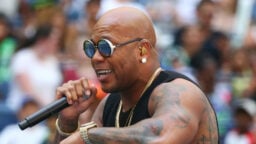Atlantic Records has long been an unimpeachable force in the UK music industry, but over the last 18 months it’s faced its fair share of challenges. Now, following a series of personnel and leadership changes, it’s entering a new era.
This time last year, the label turned a corner with the appointment of Ed Howard and Briony Turner as its new UK co-Presidents. Six months later, the industry was abuzz with news of Austin Daboh joining the label as EVP, in a dual role that also saw him join the Warner Music UK leadership team.
At the time, Daboh said that he would be supporting Howard and Turner to lead Atlantic into “the next chapter in its legendary history”. Daboh also – in this very publication – noted that he was under no illusions about the progress that needed to be made at Atlantic, Warner and in the wider UK music industry, in terms of the representation and professional advancement of underrepresented executives (particularly black female executives).
As you might recall, in one of the sterner proclamations of his Music Business UK Manifesto this summer, Daboh told his fellow industry executives that the best way to fix racial inequality within their core teams wasn’t just to sit, and Zoom, and plan.
The ultimate salve, he said, rather pointedly, was “to just do it”.
Daboh’s been busy following his own advice, and in conjunction with Atlantic’s leadership team has contributed to a string of new label hires including Kim Jarrett – who has previously worked with artists such as Jay-Z, Massive Attack and Radiohead – as Senior Video Commissioner. Other additions at Atlantic have included Leila Singh (Marketing Manager), Jennifer Akoto (Publicist), as well as Jonathan Chabala, the label’s new Audience Manager.
Atlantic UK has been updated in other ways, too. You only need look at its fast-rising modern artist roster, which includes the MOBO-nominated songwriter/rapper Darkoo, as well as North London’s Tion Wayne, who went Top 10 in June with I Dunno.
Meanwhile, the UK pop breakthroughs that Atlantic’s famous for have continued to emerge: see DJ/Producer Nathan Dawe (whose Lighter with KSI went Top 3 in the UK this summer) as well as Joel Corry, whose No.1 smash Head & Heart with MNEK has been a chart mainstay this year. And gearing up for 2021, Atlantic is developing the likes of dancehall/R&B artist Stalk Ashley, as well as plotting the return of the Ivor Novello-winning Laura Mvula, and the MOBO Award-winning Mahalia.
Not everything about Atlantic Records UK has been given a reboot, says Daboh: “The thing that’s made Atlantic so successful over the last 20 years is that super-nuanced, forensic approach when it comes to identifying, signing, and developing acts and all the promotion that comes with it. Now, we have to blend that with bringing fresh ideas to the table. [Atlantic UK A&R Director] Rich Castillo and the A&R team have been brilliant at that, delivering new ideas and ensuring that we stay culturally relevant in multiple genres, whether that be drill, UKG or beyond.”
In addition to his Atlantic responsibilities, Daboh is an influential figure in Warner Music’s global mission to progress the inclusivity of its workforce; he sits on Warner’s internal board of directors for its $100m social justice and anti-racism fund, as unveiled earlier this year. Daboh says that he and Warner Music UK CEO, Tony Harlow amongst others, have been “locked in virtual rooms for several hours” this year, thrashing out new hiring policies and executing actions that, in Daboh’s words, make Warner “a better place to work for everyone”.
Daboh reveals that Warner Music UK has now proudly committed to an internal Diversity, Equity and Inclusion report, which sets the company meaningful targets in its hiring practices, the opportunities it creates for employees and how it treats staff from the top down.
Here, Daboh discusses the new vision for Atlantic Records UK, why youth is at the center of the label today, and his excitement for the year ahead…
Since you’ve come into Atlantic six months ago, what are the headline changes you’ve seen implemented at the label?
This is a new chapter, not just for me but also for Atlantic and Warner Music. We’ve got a new management team at the label and new staff across the business who have brought new energy and ideas, and that’s already producing amazing results, and a lot of exciting new artists.
More importantly, my time here has been about building and rebuilding relationships with the community and ensuring that the next generation of young black leaders are represented at a senior level in the music business.
Let’s get into it: Atlantic UK’s relationship with the black music community needed improving following obvious recent events, something you yourself publicly acknowledged when you took the EVP job. How have you set about doing that?
Atlantic has had an amazing ten years, with the team delivering hits year after year, but we can’t deny there were some challenges last year. But the new management team here – co-Presidents Ed Howard and Briony Turner, Director of Promotions (and label Godfather) Damian Christian, GM Liz Goodwin and myself – have been taking feedback from staff to work out: What are the challenges? How can we be a better place to work for everyone?
“The whole leadership team, with the support of Tony Harlow, are putting our money where our mouth is.”
Things that have come off the back of that include how transparent we are in terms of the hiring process, and the way in which people progress through the company, plus the way that we treat different genres, and the love, attention and resources that are allocated to those genres.
We’re being more open and real about things, and that’s shown in many of the recent hires that we’ve made. The whole leadership team, with the support of Tony Harlow, are putting our money where our mouth is. I’ve been really, really happy with the progress that’s been made in my first six months of being at the company.
Where are the ideas coming from for these new internal approaches?
One thing that I’ve been proud of working for Warner over these last six months is how much the company has listened to the feedback from the ground level staff, especially the younger staff. And big up Tony [Harlow], because he’s not just been listening, he’s also been determined to put positive changes into effect, including a drive for us publishing the first Warner Music UK Diversity, Equity and Inclusion report. It’s an internal document that outlines our inclusivity targets, as well as the actions we’re taking to get us there. It includes a big piece on how we can make Warner Music UK a better place to work for non-white staff, and it’s being taken very seriously at the highest levels.
“The first Warner Music UK Diversity, Equity and Inclusion report. It’s an internal document that outlines our inclusivity targets, as well as the actions we’re taking to get us there.”
The issues we’re talking about here are not specific to Atlantic, by the way. It just so happens that a spotlight was shone on things at Atlantic for the wider world to see, and we’ve responded. I’m not looking behind my shoulder at what went on previously; I’ve always been about the now.
While everyone on the team is incredibly proud of the label’s heritage, we’re focused on building on that and foundation and adding exciting new signings like Darkoo, Tion Wayne, Laura Mvula and many others to our roster.
Your staff can see these diversity targets and will hold you accountable to them. What makes you confident about going down that route?
The work that we’ve done at Atlantic so far. When I last spoke to you, I talked about the lack of black faces in music organisations, particularly the lack of black females in organisations and I said, ‘Look, we can we can go around the houses, we can talk about and deliberate all of these things over and over, but at the end of the day, just do it. Just fucking do it.’ That’s exactly what Atlantic has done.
When it comes to hiring, when it comes to the process around promoting, when it comes to taking feedback on board.
Let’s talk about the A&R team at Atlantic UK. Where are you finding artists like Darkoo and Tion Wayne in this complex modern marketplace?
The core actions of discovering and identifying artists hasn’t really changed – it’s about looking, listening and learning from young people.
The only thing that’s changed are the platforms where we do that listening. If we were having this conversation 20 years ago, we’d be talking about school playgrounds, uni student halls, and nightclubs. Now, you’ve still got to know who’s being talked about at the back of the school bus, but there’s also these [digital] platforms where those same young people are having conversations. Obviously that’s TikTok, it’s Triller, it’s Fortnite, Roblox and so on. In some ways, because there’s so much music being released, it’s harder to identify special records and artists.
“The core actions of discovering and identifying artists hasn’t really changed – it’s about looking, listening and learning from young people.”
Sifting through all that data can be a challenge. So to help combat that, we’ve made some changes to the team, including hiring a data scientist, who’s helping us build some really interesting tools, and ways to interrogate data. We also have a wider Warner data team to plug into.
We still rely on gut feeling about records, and we’ve got our own taste, which is just as important. But the other 50% [of modern A&R] is about better reading the information in front of you.
One challenge must be balancing that forensic A&R with the authenticity of artists who are emerging from the UK.
It’s interesting, hip-hop music in the UK is quite unique in that it’s the one genre that can produce pop-like results without necessarily having pop-like production. You can literally have a freestyle shot on iPhone gatecrash the Top 40.
I’ve definitely got to big up Rich Castillo, and some of our senior A&Rs – Kevin Christian Blair, David Aghedo and Terry Appiasei. There’s a bigger team outside of them, but Rich, Kevin, David and Terry in particular know how to take that credibility that lives and breathes as part of UK street culture and black music culture, and then add a level of world class production and songwriting to it. A careful balance is definitely required.
“hip-hop music in the UK is quite unique in that it’s the one genre that can produce pop-like results without necessarily having pop-like production.”
Look at Tion [Wayne] who can have a super gritty record and go Top 10, helped by tweaking things very slightly from a production point of view, and tweaking things slightly from a melody point of view, to help reach wider audiences across streaming, radio etc.
And I think what we’re trying to do for next year with artists like Laura Mvula, Karl Benjamin, Kojey Radical, Darkoo, Tion Wayne, plus one or two others, is say to ourselves, ‘Okay, how can we keep that core beating heart of credibility that exists within their music, that honesty, but add that extra layer of world class production and/or songwriting to it?’ That’s something that Ed [Howard] and Briony [Turner] have been doing for a decade-plus now; they’re masters at it.
What’s your pitch to artists who say: I’m already releasing through Ditto etc. and doing fine, with Top 20s or Top 10 tracks under my belt independently? Especially those in the world of black music?
It’s a question that I’m answering every single day. Distribution companies like ADA do an amazing job of allowing artists to hold on to a larger share of royalties while getting their music out into the world. There’s no question about that and we actually partner with ADA on certain projects.
But if you’re looking for a global team where you’re going to have 20 people waking up every morning with you as an artist as the first thing on their mind – or the second thing on their mind, after they brushed their teeth – you need to join a major label.
“If you’re looking for a global team where you’re going to have 20 people waking up every morning with you as an artist as the first thing on their mind – or the second thing on their mind, after they brushed their teeth – you need to join a major label.”
If you open up the OCC [UK] charts, it’s true that you will see some independent records. But if you look at the biggest-selling artists of the last couple of years, you’re talking about Stormzy, No.1 platinum album, Headie One, No.1 album; Nines, No.1 album; if you’re talking about who’s having the big chart hits, the biggest albums, and generating the most amount of success, I think the evidence shows there are big advantages to the infrastructure that a major label provides.
Yes, you can make a shitload of money being an independent, and more power to the artists that do that. Also, some artists are just more adept at doing that than others; some artists are organised, some have got a bigger team around them. The work that ADA do is amazing. And of course, AJ Tracey is a brilliant example of the incredible work that gets achieved in the independent distro world. But with all that being said, as Atlantic I believe we can supplement that work in the independent world and create even larger success for artists.
There was a lot of debate breaking out in the wake of Blackout Tuesday about the descriptors of “urban music” vs. “black music”. What’s your take?
It’s a conversation I’ve been having for years now, since I joined BBC Radio 1Xtra. I think in the UK, we’re pretty much agreed – certainly at Atlantic, it’s agreed – that ‘black music’ works better than ‘urban music’. And that’s simply because of the negative connotations around urban music being pigeonholed over the years.
With that being said, there are different cultural nuances that exist in Europe and America. So in certain other countries, it’s ‘black music’ that has had the rough ride historically.
“I think in the UK, we’re pretty much agreed – certainly at Atlantic, it’s agreed – that ‘black music’ works better than ‘urban music’.”
At Atlantic, we’ve accepted that there will be certain countries and circumstances where ‘urban music’ works better. We’re also aware that some super credible, legendary black music executives in the US have come out and said that ‘urban music’ is a better term because of the success that they’ve had associated with being ‘urban music’ executives. So we need a blended approach, where we speak to black music, which we believe is the right term to use in the UK, but we definitely won’t begrudge a territory with different cultural context using ‘urban music’.
Another less polarised debate that kicked off recently surrounded ‘BAME’ – the always-awkward mouthful describing people categorised as ‘Black, Asian or Minority Ethnic’. It seems destined to be consigned to history. Good thing?
I was never super comfortable with the word BAME. Similar to ‘urban music’, I think the word should get thrown in the bin simply because it’s been used by too many organisations, too many government think tanks, when they’re lumping together cultures that in some cases have hardly anything in common whatsoever, even amongst the black community, let alone the Asian community, the South Asian community and other non-white ethnic groups.
I get that it’s difficult, because at some point you have to find a way to describe a group of things. I understand why it was created. But BAME ain’t the one.
Earlier this year Warner, in association with the Blavatnik Foundation, announced a $100m fund for social justice and anti-racist causes. You’re on the board of that fund – what can you tell us?
We’ve made our first round of grants recently and one of the largest recipients was a UK organisation called the BCA, the Black Cultural Archives, based in Brixton, at No.1 Windrush Square. They’re all about preserving the way in which the black British experience has been documented.
A lot of people scoffed when they heard about Warner’s $100m fund, assuming it was just something that was going to live in the ether, and wouldn’t be a real thing. But what we’ve seen is actually, very quickly, within weeks of the fund becoming operational, the very first donation was made.
Final question: How would you try and encapsulate the culture of the Atlantic UK you and the team are building?
We’re creating an infrastructure and an incubator that allows talent to thrive, maybe without some of the more negative pressures that have existed in the music industry in years gone by.
I would also like to note that while we at Atlantic are having a really good run at the moment, it’s not just at Atlantic where there’s success [in the UK]: look at ADA, what they’re doing with AJ Tracey, and across Warner Music, where the labels have had great years with the likes of S1mba, Pa Salieu and Nines.
That’s for those labels and for Tony [Harlow] to talk about, but credit where credit’s due: it’s not just Atlantic; Warner Music UK as a whole is fighting on all fronts, particularly in black music.
This article originally appeared in the latest (Q4 2020) issue of MBW’s premium quarterly publication, Music Business UK, which is landing with our subscribers now. MBUK is available via an annual subscription through here.Music Business Worldwide




